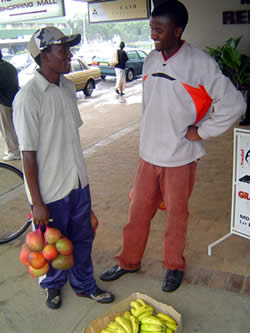Vending for a living in Zimbabwe
The increasing turmoil brought about by the harsh economic conditions has resulted in the mushrooming of many vendors along the streets of Harare. Street vending in Zimbabwe is a cocktail ranging from fruits and vegetables, flowers and medicinal herbs, rat poisons and pesticides, green backs and the much needed fuel.
Welcome to Temba Mudzengereri’s world. He’s a flower vendor plying his trade with a friend of his at the Newlands Shopping Centre. His voice has graced the parking bays of this complex for 6 months now. A professionally packed bouquet goes for at least Z$4,000.00, and on a good day Temba gets as much as Z$15,000.00. Next to him is Nicholas, a 26-year-old fruit vendor with nicely combed hair and a winning smile. “We have been here since 2003″ he tells me with a smile. Temba runs off to meet a potential customer. His face lights up with the possibility of compelling the potential client to choose his fruits rather than the other vendors. Expressions of repulsion or morbid aloofness often meet his salesman’s smile, but he shrugs them off, confident that he will come across someone who will eventually buy his wares after lengthy cajoling.
 Nicholas has a younger friend in tow; his name is Arnold. Both have cultivated that kind of trust which is key to all business partnerships. Street vending for the two is a way of life that has generated employment and secured a decent income. Like many others, Nicholas and Arnold rent accommodation in the southern surbubs of Harare for as much as ZIM$25,000 a room which they pay for through the proceeds they get from their vending.
Nicholas has a younger friend in tow; his name is Arnold. Both have cultivated that kind of trust which is key to all business partnerships. Street vending for the two is a way of life that has generated employment and secured a decent income. Like many others, Nicholas and Arnold rent accommodation in the southern surbubs of Harare for as much as ZIM$25,000 a room which they pay for through the proceeds they get from their vending.
The job of a street vendor is no walk in the park. The ever-increasing municipal police presence has made it difficult to exhibit all the wares on the street whilst maintaining the decency that comes with everyday labour. Many vendors carry just enough wares to allow them to disappear the moment municipal police arrive at the scene. Book vendors are a case in point. They have resorted to looking like regular streetwalkers and putting up posters along the city’s pavements advertising their wares. They usually stand at a distance and only provide assistance to potential customers who venture to read the posters showing particular interest.
A case of government criminalising efforts to make a living?
I think back to Operation Murambatsvina and I realise that the Mugabe regime will not formalise informal vending as long as it do not suit the greater political agenda. My memories bid me to ask Temba and Nicholas how their experience has been with the authorities.
“The Municipal police are an everyday menace,” Nicholas volunteers. “They come here at least twice a day,” Temba juts in, adding, “We run away each time they come, they say we do not have licences to trade, but they will not give us the licences”.
Vending for a living in Harare is a tough process demanding bravery in the midst of adversity.

